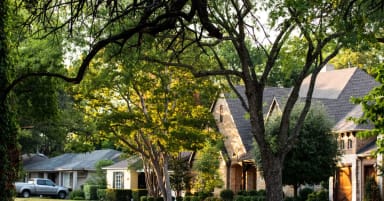Homeowners insurance covers fallen trees when they damage your home or other insured structures and the cause is a covered peril like wind, lightning, hail, fire, vandalism or a vehicle crash. In terms of tree removal, home insurance covers fallen trees when:
- A storm knocks a tree onto your house, garage, fence or shed.
- A tree falls due to fire, explosion, lightning, aircraft, riot, vandalism, theft or a non-owned vehicle and lands on your property.
- A neighbor's tree falls onto your home or yard due to a covered event.
The tree's origin doesn't affect coverage. Your insurer pays to remove the tree whether it fell from your yard, a neighbor's property or a nearby lot, as long as a covered peril caused the damage. But if your neighbor's tree was visibly diseased or dead before it fell, their negligence may make them liable for damages. You can file through your own policy first, but your insurer might seek reimbursement from your neighbor's homeowners insurance.
Coverage varies by policy and state. Contact your insurer to verify specific coverage details.





